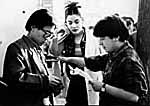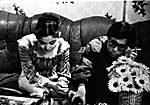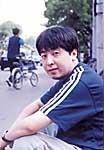In the first scene of Jia Zhangke's award-winning underground film,
the central character Xiao Wu ('Little Wu') boards a bus for his hometown
of Fenyang and avoids paying the fare by claiming he is a cop. Xiao
Wu's rude and smugly threatening demeanor makes him a convincing Chinese
police officer and the witless ticket collector-only slightly dimmer
than the pickpocket himself-buys the ruse. Jia's cinema-verité camera
takes us to the front of the bus for a peek at an antique Mao medallion
hanging from the rear-view mirror, then returns us to Xiao Wu's seat
where he is quietly executing a hostile take-over of the wallet in the
coat of the hapless passenger next to him.

Xiao Wu is a good-for-nothing drain on society. He oozes malaise.
This monosyllabic, cheap-suit-wearing, chain-smoking, ill-postured loiterer
is perhaps the most hopeless loser ever to darken a movie screen. You
can hear the sucking sound produced by two decades of winner-take-all
greed, confusion, and despair as it whistles through his soul. His meandering
gait echoes the rhythms of someone dragging an over-loaded, grimy handbasket
to hell. Xiao Wu is so pathetic, you can almost see ducts of downtrodden
pathos and meanness welling under his eyes, threatening to explode through
his comically large horn-rimmed glasses.
But he somehow manages to be so irrepressibly lovable that you want
to invite him in for dinner, point out the cabinets containing the expensive
silverware and ask him to turn off the lights before he leaves and lock
the door behind him.

Xiao Wu is a pickpocket who takes cash, but deposits victims' ID cards
in mailboxes so the police can return them to the victims of his trade.
He is likeably shy, irresistibly lost, a loner too proud to admit his
isolation, an injured young heart in need of love-any love-but trapped
by the fact that he only knows one way to survive. He is also, improbably
and compellingly, a human being with his own moral compass, a decent
heart, and a set of values he believes in.
Although his childhood friend Xiaoyong neglects to invite him to his
wedding in the backward county seat of Fenyang in Shanxi Province, Xiao
Wu still makes an effort to fulfill a childhood promise of bringing
a nuptial gift of cash.
A petty thief who graduated to cigarette trafficking and managing karaoke
bars, Xiaoyong has recently been designated a 'model entrepreneur,'
and considers himself a legitimate businessman, unfit to have any truck
with a low-life criminal like Xiao Wu. He not only refuses to accept
Xiao Wu's wedding gift, but returns it, calling it dirty money.

In the midst of a citywide campaign against petty street crime, the
humiliated and alienated Xiao Wu stumbles upon a tentative sort of love
with Meimei, a leggy karaoke girl who is touched by his kind act of
visiting her when she has the flu. (In a gesture bitterly emblematic
of the zeitgeist, on her sickbed he offers her a cigarette as balm for
her discomfort.) When Meimei asks him to sing her a song, the introverted
thief, too bashful to sing, flips open his lighter which plays Für Elise
in tinny electronic tones.
Meimei soon adopts him as her sugar daddy, inspiring Xiao Wu to lift
wallets with increasing vigor to support a degraded form of happiness
and even take his first baby-step into the mucky modernity of the 1990s
by buying a pager-so that Meimei can keep in touch with him. In the
end, crime does not pay, love does not last, and even the pager betrays
him as the entire town seems to turn on the lovably pitiful thief born
in the wrong place at the wrong time. Yet Xiao Wu, a wonderfully crafted
anti-hero, pulls through with his values intact. His inability to welsh
on a simple promise somehow renders him more redeemable than anything
else in dreary Fenyang-a city at the time only six months from being
torn down and rebuilt in the familiar white-tiled lavatory-style architecture
so popular in post-Deng China.
No Budget, No Approval, No Problem
With rmb 400,000, a 16mm camera, a cast of non-professional actors,
a crew working for nothing (aka 'deferred payment'), and no official
approval from the Film Bureau, Xiao Wu went on to garner the 1998 Berlin
Film Festival's Wolfgang Staudte Award and the San Francisco International
Film Festival's $10,000 best-film prize, and was also a featured selection
at the New Directors/New Films series, jointly presented by New York's
Museum of Modern Art and the Lincoln Center.

Xiao Wu, although banned from distribution in China, has also proved
to be a commercial success, and is being distributed in Germany, France,
Belgium, Switzerland, Japan, Korea, Australia, and Canada, with talks
under way for England, Argentina and the US.
In addition to paying for itself many times over, Xiao Wu has won Jia
funding for his next film from Japan's Jim Carrey-meets-Quentin Tarantino
actor-director Takeshi Kitano, with rights presold to France and a post-production
deal that will have Jia editing his film while munching croissants and
sipping cafe au laits.
Independence AND Tradition
Jia Zhangke prefers not to be called an 'underground' filmmaker-"no
one wants to be an underground director!"-or a 'sixth-generation' filmmaker,
but rather an independent director. And he considers the fact that Xiao
Wu has branded him an underground filmmaker almost incidental.
"My investment came from Hong Kong, so because Hong Kong and China are
'one country, two systems,' and my investor didn't care about the mainland
market, we didn't bother with the censorship process. Also, I shot in
16mm which, according to regulations, means it's a non-commercial film,
an informal work."
Indeed, no films originally shot in 16mm, rather than the industry standard
35mm, are allowed to be shown in Chinese theaters, even if the final
print is transferred to 35 mm.
"But as a result, I've had some 'misunderstandings' with the Film Bureau.
They didn't explicitly say they were blacklisting me," he explains.
"But there was a period of 'self-criticism,'" he says, laughing at the
ironic ring of the Cultural Revolution term.
In fact, the original working titles for Jia's film were inspired by
Cultural Revolution rhetoric: Jin Xiaoyong's Buddy, Hu Meimei's Sugar
Daddy and Liang Changyou's Son. Jia read a Cultural Revolution-era People's
Daily article criticizing the poet Ai Qing. It described him as 'Ding
Ling's friend, so-and so's partner, so-and-so's buddy.'
"And it struck me that for so many years Chinese have never had their
own identity. When you identified someone, you'd always put him in the
context of his relationships to other people: He's so-and-so's friend,
so-and-so's child. But the only thing he isn't is himself," Jia observes.
So, the young director endeavored to write a film about a character
caught within these human relationships during the large-scale societal
changes brought about by two decades of economic reform and opening
up.
"My initial idea was to find a character who worked with his hands,
someone without much connection to contemporary society, like a tailor
in a small city, or a shoemaker, or a cook-an artisan supporting himself
by very traditional means. I wanted to see his experience in the midst
of the change China is experiencing now," Jia says.
But as with many good stories, Jia eventually found his true inspiration
for his 'artisan' in prison. A middle school classmate working as a
prison guard in Fenyang mentioned to Jia that another classmate had
been locked up for pickpocketing. When Jia inquired whether the guards
and inmates could talk, his friend related, "Sure, we often chat and
play cards or chess. And this guy is really bizarre! He's always talking
about philosophy, questions like what's the point of living? What will
become of humanity later on?"
"This really affected me," says a very animated Jia.
"Here was this small-time criminal pondering big, faraway questions
that, on the surface, seemed so far removed from his own life. A petty
thief that has a entire world of his own. So I made up my mind to write
about a thief-especially this kind of thief, because his method of stealing-pickpocketing-is
relatively traditional.
"In the context of an entire society moving ahead, seeking to pursue
happiness," says Jia, "Xiao Wu is someone unable to deal with the changes.
He runs into walls everywhere he turns. "But some people in these times
are like fish in water." Jia sardonically smiles. "They're getting along
extremely well."
Xiao Wu's former buddy Xiaoyong runs karaoke bars (featuring various
degrees of sexual commerce) and traffics contraband cigarettes, but
within the context of changing times, he's no longer seen as a criminal.
When Xiao Wu points out the degree of criminality inherent in Xiaoyong's
dealings, a lackey corrects Xiao Wu: "His cigarette business isn't trafficking.
It's called 'free trade.' And he's never exploited his bar girls. It's
called 'entertainment.'"
"In this age," says Jia, "people have lots of pretexts for what they're
doing; they can use a single euphemism to change the reality, and that
makes it legal.
"But a pickpocket is different. He's always a pickpocket, and his actions
will always be those of a pickpocket."
On another level, Xiao Wu ponders what Chinese people have lost. "In
their youthful days," explains Jia, "Xiao Wu and his buddies shared
a kind of code of brotherhood and respected the sanctity of a promise.
These are things we've lost."
In a poignant scene, the loitering Xiao Wu snatches a peach from a passing
fruit peddler, while in the background we hear the soundtrack from John
Woo's The Killer, the classic Hong Kong action ode to honor among thieves
and nostalgic longing for the good old days.
"Xiao Wu still has these," says Jia. "He's got a good side to him. He
returns his victims' ID cards. He promised Xiaoyong he would give him
money on his wedding day and he intends to keep this promise. He has
a moral bottom line that he still believes in.
"But someone like Xiaoyong is terrifying. He's an abyss. There is no
boundary to his brand of morality. One word can excuse all his moral
responsibility and whitewash his crimes."
A Generation of Filmmakers
It's difficult to miss the unintended parallels between Jia Zhangke's
pickpocket Xiao Wu and Jia Zhangke himself, as a director and bright
star of the so-called 'Sixth Generation.'
In a recent magazine interview, Zhang Yimou appraised the younger generation
of 'underground' filmmakers with a degree of skepticism: "There are
two realities in Chinese filmmaking: First, there is the political reality-the
censorship of one's work; second, the commercial reality-the requirements
of the box office. A film director must conform to these two realities,
even if it means compromise. After he's adapted
himself to these two restrictions, he may add his own artistic characteristics
and retain his individual style. I don't think you'll see any transformation
of these realities for the next 30 or 50 years.
Underground filmmaking is not a long-term option for a career." "We
all face different realities," objects Jia. "When Zhang Yimou talks
of conforming to the political reality of our times, well, his reality
is very different from ours. With the same topic, he can get approval
whereas we probably can't. He can shoot Not One Less. I wouldn't be
allowed to. That's because his work is measured by a different yardstick.
Due to differences in age, position, and relationships, our realities
are totally different!
You can't use your reality to look at mine."
Indeed, the phenomenon of Xiao Wu-an extremely low-budget underground
Chinese film making a profit and winning critical respect overseas-means
that Jia Zhangke can create his own commercial and artistic reality.
"As a director, I'm very excited and stimulated by what I see around
me," he says.
"China is in the midst of great change, with so many things disappearing
before our eyes. I think there's a responsibility to film that, so that
in the future we'll be able to see how it really was.With this kind
of creative work, I can't wait. If I'm able to shoot, then I must shoot.
Afterwards, it's possible that I won't be able to have it seen here.
But that's not a big problem. So, you can't show it today. Sooner or
later you'll be able to show it. It's a film, after all. Films are long-term
investments. "Zhang Yimou and the Fifth Generation came up together,
as a group. A group has its benefits, its power, but it also erodes
individual creativity and the burden of responsibility. Among the younger
generation of directors, we say: This is my film. I take full responsibility
for it," Jia states.
Not unlike his anti-hero Xiao Wu, one can sense Jia Zhangke's bottom
line. While his next film, a story of a cultural worker's unit (a song-and-dance
troupe) is indeed seeking to find compromise with the political reality
of China's film industry, it appears that he will, at a deep level,
remain true to his own individual reality.
Quoting a favorite two-line poem by his friend, well-known poet Xi Chuan,
Jia ends our interview by reciting what could very well be the battlecry
of a new, independent generation of Chinese film artists unable to welsh
on their promises to themselves:
The crow solves the crow's problems
I solve mine
Wuya jiejue wuya de wenti
wo jiejue wo de wenti